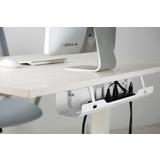Ethernet Cables
- Sort-by
- Default |
- Price Low or High |
- New Arrivals |
- Highest Rating |
- Popular
-
 Primecables’ choice
Primecables’ choiceCat6 Ethernet Cable with Gold-Plated Connectors- White - 1ft, 1/Pack - PrimeCables®
Premium conductor material supports download speeds up to 10 Gb/s{{retail_price_str}} {{product_unit_price_str}}{{list_price_str}}Currently Out Of Stock -
 Primecables’ choice
Primecables’ choiceCat6 23AWG UTP Solid Bulk Cable CMR Rated 1000ft - PrimeCables® - Black
Cat 6 performance for a Gigabit Ethernet Network{{retail_price_str}} {{product_unit_price_str}}{{list_price_str}}Currently Out Of Stock -
 Primecables’ choice
Primecables’ choiceCat6 550MHz UTP 24AWG RJ45 Ethernet Network Cable Blue - PrimeCables® - 6ft, 1/Pack
Premium conductor material supports download speeds up to 10 Gb/s{{retail_price_str}} {{product_unit_price_str}}{{list_price_str}}Currently Out Of Stock -
 Primecables’ choice
Primecables’ choice1FT Cat6 550MHz UTP 24AWG RJ45 Ethernet Network Cable - Red - PrimeCables® - 1/Pack
Premium conductor material supports download speeds up to 10 Gb/s{{retail_price_str}} {{product_unit_price_str}}{{list_price_str}}Currently Out Of Stock -
 Primecables’ choice
Primecables’ choice1FT Cat6 550MHz UTP 24AWG RJ45 Ethernet Network Cable - Yellow - PrimeCables® - 1/Pack
Premium conductor material supports download speeds up to 10 Gb/s{{retail_price_str}} {{product_unit_price_str}}{{list_price_str}}Currently Out Of Stock -
 Primecables’ choice
Primecables’ choiceCat6 550MHz UTP 24AWG Ethernet Network Cable Black - PrimeCables® - 0.5ft, 1/Pack
Premium conductor material supports download speeds up to 10 Gbps{{retail_price_str}} {{product_unit_price_str}}{{list_price_str}}Currently Out Of Stock -
 Primecables’ choice
Primecables’ choiceGoSlim Cat6 28AWG UTP Ethernet Network Cable White - PrimeCables® - 0.5ft
Best for Data Center & Telecommunications rooms{{retail_price_str}} {{product_unit_price_str}}{{list_price_str}}Currently Out Of Stock -
 Primecables’ choice
Primecables’ choiceCat 7 Network Cables Twisted Pair S/STP White- PrimeCables® - 1ft, 1/Pack
24 AWG Stranded Ethernet Cable from PrimeCables to offer you better durability and flexibility{{retail_price_str}} {{product_unit_price_str}}{{list_price_str}}Currently Out Of Stock -
 Primecables’ choice
Primecables’ choiceGoSlim Slim Cat6 28AWG UTP Ethernet Network Cable Blue - PrimeCables® - 0.5ft
Best for Data Center & Telecommunications rooms{{retail_price_str}} {{product_unit_price_str}}{{list_price_str}}Currently Out Of Stock -
 Primecables’ choice
Primecables’ choiceCat 7 Network Cables S/STP Blue - PrimeCables® - 6ft, 1/Pack
24 AWG Stranded Ethernet Cable from PrimeCables to offer you better durability and flexibility{{retail_price_str}} {{product_unit_price_str}}{{list_price_str}}Currently Out Of Stock -
 Primecables’ choice
Primecables’ choiceGoSlim Cat6A 28AWG UTP Ethernet Network Cable Black- PrimeCables® - 1ft
For 10Gb Ethernet network connections such as patch panels, switches, computers and routers{{retail_price_str}} {{product_unit_price_str}}{{list_price_str}}Currently Out Of Stock -
 Primecables’ choice
Primecables’ choiceGoSlim Slim Cat6 28AWG UTP Ethernet Network Cable Black - PrimeCables® - 0.5ft
Best for Data Center & Telecommunications rooms{{retail_price_str}} {{product_unit_price_str}}{{list_price_str}}Currently Out Of Stock -
 Primecables’ choice
Primecables’ choiceSlim Cat6A 28AWG UTP Ethernet Network Cable CMR/FT4 Blue- PrimeCables® GoSlim - 0.5ft
CMR/FT4, 4mm OD, Bare Copper Wire{{retail_price_str}} {{product_unit_price_str}}{{list_price_str}}Currently Out Of Stock -
 Primecables’ choice
Primecables’ choiceSlim Cat6A 28AWG UTP Ethernet Network Cable - red - PrimeCables® GoSlim - 1ft
Designed for Tight Space on Patch Panel{{retail_price_str}} {{product_unit_price_str}}{{list_price_str}}Currently Out Of Stock -
 Primecables’ choice
Primecables’ choiceSlim Cat6A 28AWG UTP Ethernet Network Cable - Yellow - PrimeCables® GoSlim - 1ft
Designed for Tight Space on Patch Panel{{retail_price_str}} {{product_unit_price_str}}{{list_price_str}}Currently Out Of Stock -
 Primecables’ choice
Primecables’ choiceGoSlim Slim Cat6 28AWG UTP Ethernet Network Cable Yellow - PrimeCables® - 0.5ft
Best for Data Center & Telecommunications rooms{{retail_price_str}} {{product_unit_price_str}}{{list_price_str}}Currently Out Of Stock -
 Primecables’ choice
Primecables’ choiceCat 7 Network Cables S/STP 1Ft Black - PrimeCables® - 1ft, 1/Pack
24 AWG Stranded Ethernet Cable from PrimeCables offer you better durability and flexibility{{retail_price_str}} {{product_unit_price_str}}{{list_price_str}}Currently Out Of Stock -
 Primecables’ choice{{retail_price_str}} {{product_unit_price_str}}{{list_price_str}}Currently Out Of Stock
Primecables’ choice{{retail_price_str}} {{product_unit_price_str}}{{list_price_str}}Currently Out Of Stock -
 Primecables’ choice{{retail_price_str}} {{product_unit_price_str}}{{list_price_str}}Currently Out Of Stock
Primecables’ choice{{retail_price_str}} {{product_unit_price_str}}{{list_price_str}}Currently Out Of Stock -
 Primecables’ choice
Primecables’ choiceCat6 23AWG UTP Solid Bulk Cable CM Rated 1000ft - PrimeCables® - Blue
Cat 6 performance for a Gigabit Ethernet Network{{retail_price_str}} {{product_unit_price_str}}{{list_price_str}}Currently Out Of Stock -
 Primecables’ choice
Primecables’ choiceCat6 Flat Internet Network Ethernet Patch Cable Short - Black PrimeCables® - 0.5ft
Flat Cat 6 cable design helps avoid tangled cords and saves space{{retail_price_str}} {{product_unit_price_str}}{{list_price_str}}Currently Out Of Stock -
 Primecables’ choice
Primecables’ choiceCat6 23AWG UTP Solid Bulk Cable CMR-Rated 500ft - PrimeCables® - Black
Cat 6 performance for a Gigabit Ethernet Network{{retail_price_str}} {{product_unit_price_str}}{{list_price_str}}Currently Out Of Stock -
 Primecables’ choice
Primecables’ choiceCat6 23AWG UTP Solid Bulk Cable CM-Rated 500ft - PrimeCables® - Blue
Cat 6 performance for a Gigabit Ethernet Network{{retail_price_str}} {{product_unit_price_str}}{{list_price_str}}Currently Out Of Stock -
 Primecables’ choice
Primecables’ choiceSlim Cat6A 28AWG UTP Ethernet Network Cable CMR/FT4 yellow - PrimeCables® GoSlim - 1ft, 1/Pack
For 10Gb Ethernet network connections such as patch panels, switches, computers and routers{{retail_price_str}} {{product_unit_price_str}}{{list_price_str}}Currently Out Of Stock












































































































































































































































































































































































